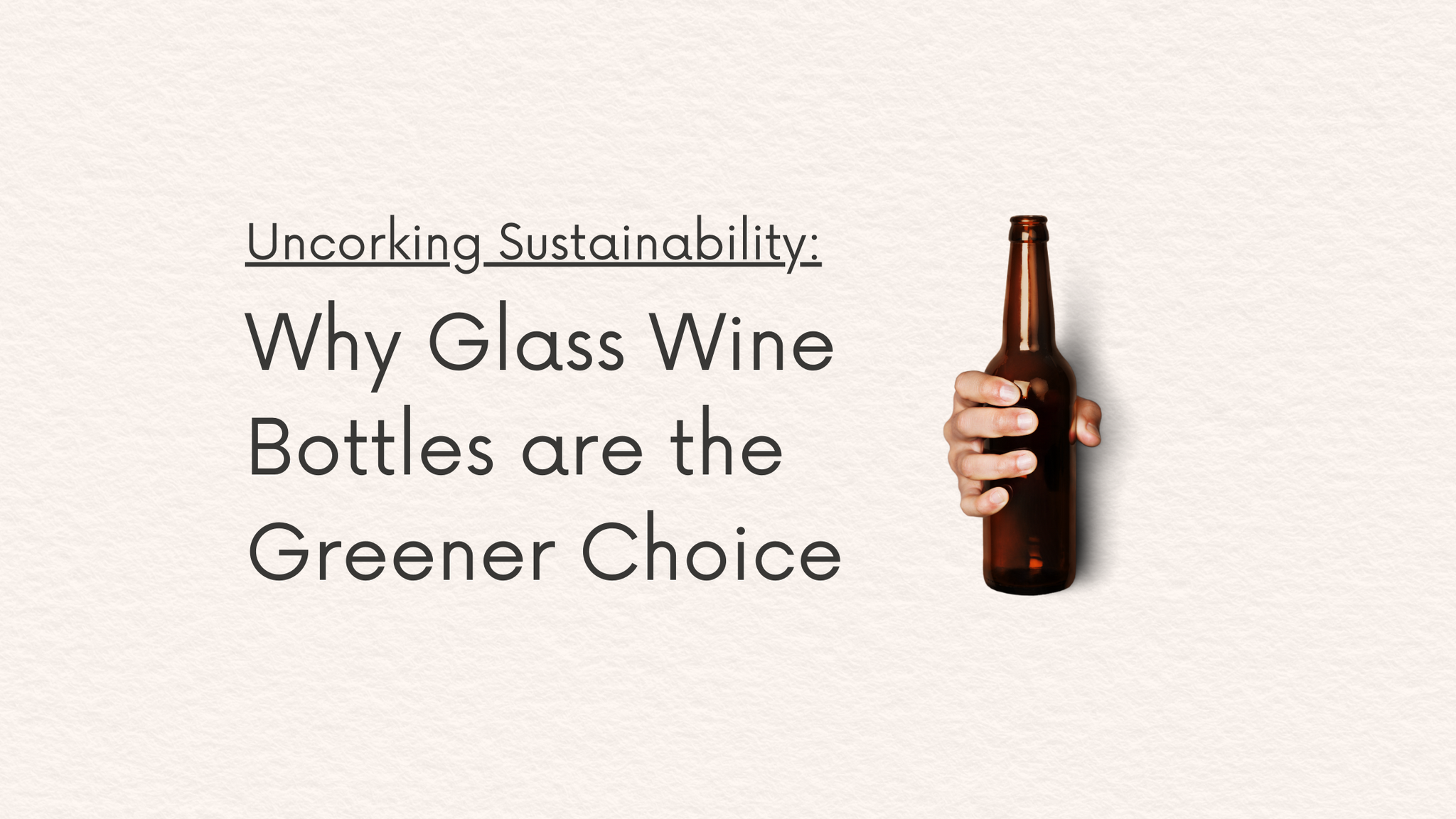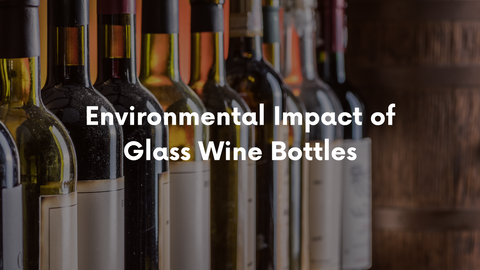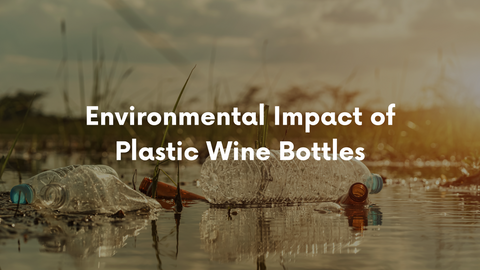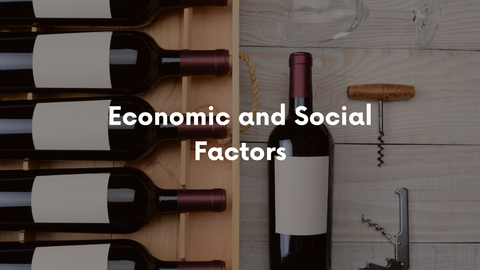Uncorking Sustainability: Why Glass Wine Bottles are the Greener Choice
Have you ever paused to ponder the environmental impact of that delightful bottle of wine you uncork at the end of a long day? Wine, with all its sophistication and charm, often comes encased in a choice between glass and plastic bottles. But which is truly the greener option? Today, we're diving into the debate swirling around glass versus plastic wine bottles, to uncork the truth behind their environmental footprint.
Picture this: mountains of discarded packaging, sprawling landfills, and oceans choked with plastic waste. The environmental toll of packaging materials is undeniable. Yet, amidst this crisis, the choice between glass and plastic wine bottles stands as a microcosm of a broader dilemma. Let's explore the lifecycle analysis of these materials to understand their true impact.
When you think of wine, what's the first thing that comes to mind? Perhaps it's the rich aroma, or the satisfying clink of glasses as you raise a toast. But have you ever stopped to think about the impact of the bottle itself? Let's take a closer look at why glass wine bottles are not just a vessel for your favorite vintage, but a sustainable choice for the planet.
- Recyclability: Glass wine bottles are like the ultimate eco-friendly chameleon – they can be recycled endlessly without losing quality. That means every time you toss a bottle into the recycling bin, you're helping to close the loop on waste and conserve precious resources.
- Preservation of Taste and Quality: Ever noticed that wine tastes better when it comes from a glass bottle? That's because glass is inert, meaning it won't interact with the wine and alter its flavor. So go ahead, savor every sip without worrying about any unwanted chemical surprises.
- Aesthetic Appeal and Tradition: There's something undeniably romantic about uncorking a bottle of wine sealed with a cork. Glass wine bottles embody centuries of tradition and craftsmanship, adding an extra touch of elegance to any occasion.
But what about their carbon footprint, you ask? Fear not, for innovations in glass packaging are paving the way for sustainability in the wine industry. From lightweight designs to optimized transportation methods, the glass bottle of the future is greener than ever before!
As we continue our exploration of the glass vs. plastic debate in wine bottle packaging, it's time to shine a spotlight on the often-criticized plastic wine bottles. Despite their widespread use, these bottles come with a laundry list of environmental concerns and drawbacks that are worth considering. Let's delve into why plastic wine bottles might not be the best choice for the planet:
- Non-biodegradable Nature: Plastic wine bottles, once discarded, linger in our environment for hundreds of years without breaking down. This leads to alarming levels of plastic pollution in landfills and oceans, threatening wildlife and ecosystems.
- Chemical Leaching: Picture this – you're eagerly pouring a glass of your favorite vintage, only to discover that it's tainted with chemicals from the plastic bottle. Plastic wine bottles have the potential to leach harmful substances into the wine, compromising its quality and safety.
- Recycling Challenges: Unlike glass, plastic is notoriously difficult to recycle. Its complex composition and limited market demand for recycled plastic make it less economically viable to recycle, resulting in much of it ending up in landfills or incinerators instead.
So, while plastic wine bottles may seem convenient at first glance, their environmental footprint tells a different story. It's time to rethink our packaging choices and opt for more sustainable alternatives like glass.
In the clash of glass versus plastic, numbers don't lie. A comparative analysis reveals the carbon footprint of glass bottles pales in comparison to their plastic counterparts. While glass may be heavier and require more energy for transportation, its recyclability and longevity tip the scales in its favor. And when it comes to waste management, glass bottles emerge as champions, with the potential to be transformed into new bottles again and again!
It's essential to consider not only the environmental impact but also the economic and social factors at play. After all, in a world where every dollar counts and sustainability is on everyone's lips, the choice between glass and plastic bottles carries significant weight.
- Cost Analysis: Let's talk dollars and cents. While plastic bottles may initially seem like the more budget-friendly option for wineries, a closer look reveals a different story. Yes, plastic may offer short-term savings in production and transportation costs. Still, when you factor in the long-term benefits of glass – such as recyclability and consumer perception – the economic scales begin to tip in favor of glass.
- Sustainability: In today's eco-conscious landscape, sustainability is no longer a buzzword – it's a business imperative. And when it comes to packaging choices, the sustainability credentials of glass bottles speak volumes. From their recyclability to their potential for reuse, glass bottles embody a commitment to environmental stewardship that resonates with consumers.
- Consumer Perception: Let's face it – perception is everything. And when consumers see a bottle of wine nestled in glass versus plastic, it sends a powerful message. Glass bottles convey a sense of quality, tradition, and luxury that plastic simply can't match. In a crowded marketplace, where brand image is everything, the choice between glass and plastic can make or break a winery's reputation.
In the end, the economic and social factors surrounding the choice between glass and plastic wine bottles underscore a fundamental truth – sustainability is not just a moral imperative; it's also a smart business decision.
Regulatory Landscape and Future Outlook
The future of wine packaging is bright with possibilities. From government regulations to emerging trends, the landscape is evolving to embrace sustainability. Let's explore the regulatory framework and industry trends shaping the wine industry's journey toward a greener future!
- Bottle Deposit Schemes: Imagine a world where returning your empty wine bottle earns you a little extra cash. Bottle deposit schemes incentivize consumers to recycle by offering a refund for returned bottles. These programs not only promote recycling but also encourage responsible consumption.
- Innovative Packaging Solutions: From biodegradable materials to lightweight designs, the quest for sustainable packaging solutions is driving innovation in the wine industry. Wineries are exploring alternative materials and packaging formats to reduce environmental impact without compromising quality or aesthetics.
- Consumer Demand for Sustainability: In an era of heightened environmental awareness, consumers are demanding more sustainable options from their favorite brands. From millennials to baby boomers, eco-conscious consumers are voting with their wallets, driving the industry towards greener practices.
As we look towards the future, one thing is clear: change is on the horizon. With regulatory support, industry innovation, and consumer demand, wineries are poised to lead the charge towards a more sustainable future for wine packaging!
Let's take a moment to reflect on the profound impact of our choices – not just on the wine we enjoy, but on the world we inhabit. With each clink of glass, let's raise a collective toast to the ecological champions of wine packaging: the timeless and sustainable glass bottles.
But our journey towards sustainability doesn't end with the last drop. Let's use our glasses as vessels to raise awareness about the environmental virtues of glass wine bottles. Let's spread the word far and wide, urging consumers to opt for eco-friendly packaging that preserves the planet for generations to come!
And let's not forget the crucial role of wineries and policymakers in this crusade. By embracing sustainable practices and implementing forward-thinking policies, they can pave the way for a greener future. Let's hold them accountable, encouraging them to prioritize sustainability in every aspect of production and packaging.
In this age of heightened environmental consciousness, every sip we take and every bottle we uncork holds the potential for positive change. Let's make each pour count, knowing that our choices today shape the world we pass on to tomorrow!
So here's to a future where sustainability is not just a buzzword, but a way of life – where every glass raised is a celebration of the earth's beauty and resilience. Cheers to a world where the allure of sustainability is as intoxicating as the finest vintage. Cheers to a future worth raising our glasses to. Cheers!

















